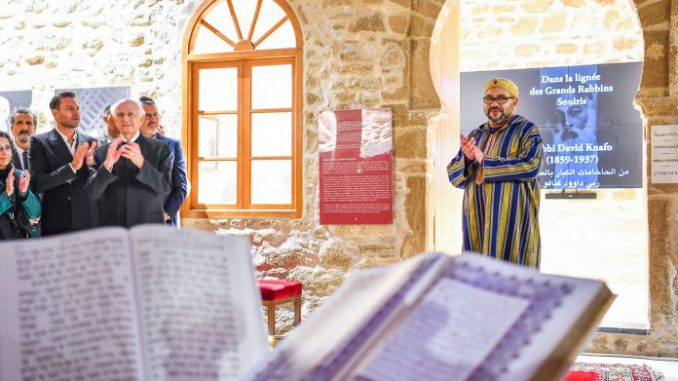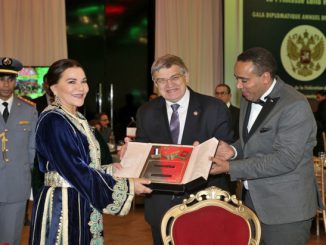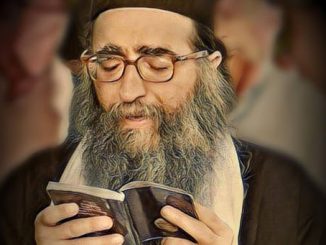
His Majesty King Mohammed VI, Amir Al-Mouminine, may God bless him, visited on Wednesday in the old medina of Essaouira, “Bayt Dakira”, a spiritual space of preservation and enhancement of the Judeo-Moroccan memory, unique in its kind in the southern Mediterranean and in the land of Islam.
Indeed, this historical, cultural and spiritual space is home, after restoration work, to the “Slat Attia” Synagogue, the “Bayt Dakira” House of Memory and History and the Haim and Celia Zafrani International Research Center on the History of Relations between Judaism and Islam.
The Sovereign’s visit to this place reflects the special interest that H.M. the King, Amir Al-Mouminine, attaches to the cultural and religious heritage of the Moroccan Jewish community, and his permanent desire to preserve the richness and diversity of the spiritual components of the Kingdom and its authentic heritage.
Upon his arrival at “Bayt Dakira”, His Majesty the King was welcomed by the Sovereign’s Counsellor, President of the Essaouira-Mogador Association, Mr. André Azoulay, before being greeted by the members of the Scientific Committee of “Bayt Dakira” and of the office of the Essaouira-Mogador Association, initiator of this construction site, and the architects in charge of the restoration of this project.
The Sovereign was then greeted by the Chief Rabbi of Casablanca, Mr Joseph Israel, and Chief Rabbi Mr David Pinto, before visiting the “Slat Attia” prayer hall, one of the most emblematic synagogues of Essaouira-Mogador, which reflects the exceptional singularity and richness of Moroccan Judaism.
The Sovereign was then greeted by Ms Audrey Azoulay, Director-General of the United Nations Educational, Scientific and Cultural Organization (UNESCO).
Mr André Azoulay then presented His Majesty the King, Amir Al-Mouminine, with the two Holy Books: The Koran and the Torah.
On this occasion, the singer Michel Abittan performed religious songs, before the Chief Rabbi of Casablanca, Mr. Joseph Israel, pronounced a blessing for H.M. King Mohammed VI, may God preserve him.
Subsequently, the Adviser to H.M. the King, President of the Essaouira-Mogador Association, Mr. André Azoulay, delivered an address to the Sovereign in which he affirmed that the Sovereign’s visit seals the rebirth of the city of Essaouira, which has always been turned towards the rest of the world, noting that it is a historic day which bears the imprint of “our secular and millenary Morocco which has been able to protect the very great diversity, which is the central wealth of our country”.
“This house is that of memory and history. It is also that of the Moroccan compass that the world needs today, a world in search of landmarks, a world that turns its back on all those values that are those of our country under the leadership of His Majesty the King, Amir Al-Mouminine,” Mr. Azoulay added.
Bayt Dakira, whose center of gravity is the “Slat Attia” Synagogue, is a place of memory that tells through objects, texts, photos and film the exceptional saga of Judaism in the city of Essaouira and its heritage: from the tea ceremony to the Hebrew poetic art, from the goldsmith’s art of gold and silver filigree to the embroidery and the making of sumptuous caftans, from the cultural arts to literature and from the rituals smiled at in the synagogue to the great trading posts which made the influence of Mogador in the 18th and 19th century.
“Bayt Dakira”, which presents and explains all the passages of Jewish life in Essaouira, from birth to death and from Bar Mitzvah to marriage, is also a place of pedagogy thanks to the Haim and Celia Zafrani Research Center on the History of Relations between Judaism and Islam, which constitutes a space of exchange between researchers of various horizons and a space of sharing, transmission and resistance to amnesia.
At the end of the visit, His Majesty the King, Amir Al-Mouminine, was greeted by 27 personalities from the Moroccan Jewish community and the world.
The elders can rest in peace. Moroccan Jewish memory has its guardians. From all generations and all faiths, Moroccans of all births and faiths are now mobilized, each at his or her own level and in his or her own living space, to preserve, perpetuate and promote Moroccan Judaism, a unique and often exemplary component of Morocco’s plural identity.




Be the first to comment